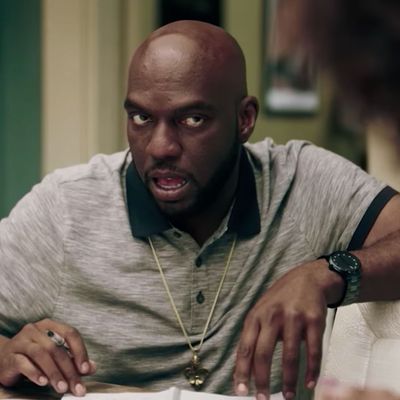
Ernest Bordelon’s spirit is felt throughout this season’s fourth episode, “No Haven in My Shadow.” This week, the Bordelon clan must tackle irrevocable differences, uncomfortable truths, and leaps of faith as they pay tribute to the family’s patriarch.
When we left the Bordelons, Darla had just returned to town. What could her return to St. Josephine mean for Blue and Ralph Angel? Darla is back to stay and everything has changed. Her mere presence has emotionally paralyzed Ralph Angel. “How do we do this?” he asks. What does co-parenting look like when there are so many things left unsaid that need to be addressed? Ralph Angel is hesitant to give Darla an inch in terms of her relationship with Blue. “We’ll figure it out,” is the one thing Darla and Ralph Angel can seem to agree on, but without talking to each other past the surface level, it may be hard to accomplish. In the end, Ralph Angel allows Darla to accompany Blue on a field trip, crossing out his name for hers. Progress.
At the church, Violet is dealing with her churchgoing frenemy — Ms. Effie. Ms. Effie, despite Violet’s continuous donations to the church in order to use their kitchen, seems hell-bent on settling an unspoken score. On the bright side, Hollywood offers to buy Violet a delivery truck. “[At] this point in my life, I don’t want to owe nobody nothing,” she tells him. Violet’s ex-husband rubbed everything he did for her in her face. Violet accepts the truck after all, but not after some long thought.
Charley delves deeper into the Landry and Boudreaux families and their clan is a rabbit hole of secrets and dirty dealings. Relatedly, the Landrys are forcing many farmers off their land, including Prosper, a longtime Bordelon family friend. When Charley confronts Jacob Boudreaux, he claims it’s the doing of the EPA, allegedly because of damage done to the land due to the recent hurricanes. There is supposedly mercury in the land that needs to be tested, but nothing with the Landrys is ever straightforward. “You’re part of this too, now,” Jacob reminds Charley. That she is.
Elsewhere, Davis and Micah are spending quality time together. After their trip to the arcade, Davis shares that he and Ernest had a special relationship — he was a father-in-law that took on the role as father for Davis. The impromptu heart-to-heart is a segue into a shocking truth Davis shares with Micah: he fathered a child while married to Charley. The child, 13-year-old Tia, will shortly be in the picture because her mother has died and Davis has stepped up to be publicly involved in his other child’s life. Micah knew that his parents’ marriage was not perfect, but discovering a sibling not much younger than him rocks whatever mythology he had formed about his father’s virtues.
At the Bordelon farm, Remy is hosting agricultural students and Nova has agreed to speak to them. Remy is shaping his students to join the less than 2 percent of black farmers in America — a dismal number that is the result of many factors. Afterwards, Nova shares a story with Remy about Ernest enduring the indignity of quotidian racism during a family fishing trip. There is a long history of black Americans having to remove themselves from public spaces due to external threats from white racism, and the Bordelons are not unlike many black families who have to twist themselves under the confines of white supremacy.
In the end, the family is brought together for the bonfire to honor Ernest’s life. Each Bordelon throws a message for Ernest into the fire, and hopes it reaches heaven.

